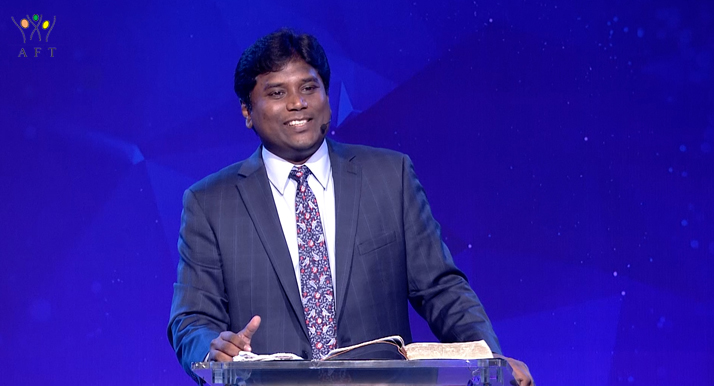
The Christian Way of approaching Adversity (Part-3): Why we fail in tests of faith?
Sunday English Service – 14 MAR 21
Transcript
James chapter 1. We’ve been talking about what is the Christian approach to trials? How do we as Christian’s approach difficulties, sufferings, problems, trials, challenges, whatever. As we know, you can’t avoid the trials absolutely. They’re an inevitable part of this life. You simply can’t get around it. You can’t say I won’t face any problem, any challenge? No, that’s not the way we need to approach life. The new Testament very clearly teaches, Jesus says in this world, you will have tribulation. Peter says, don’t be surprised when the fiery trials come. Says, don’t be surprised. And so trials come. How do we respond? They’re going to come anyway and we’re going to respond anyway. We got to respond some way. The question is how are we going to respond? Are we just going to respond however we feel like it on that day, whatever seems to come naturally, are we going to respond just from our flesh? Are we going to respond with the way of the world, how other people in the world respond? How people others handle it, or are we going to respond with the Christian way?
There is a Christian way of responding to trials and it is very clearly taught in the new Testament. And that is what we have begun to study from James chapter 1, a very important passage on this subject, in the new Testament, there are several passages on this subject. There’s a clear teaching in the new Testament as to how Christians are to respond to trials. And this is a very important passage amongst those many passages. And so let’s read this passage from verse 2 to verse 8, James chapter 1 verse 2 to 8. My brethren count it all joy, when you fall into various trials, knowing that the testing of your faith produces patience, but let patience have its perfect work that you may be perfect and complete lacking in nothing. If any of you lacks wisdom, let him ask of God who gives to all liberally and without reproach and it will be given to him, but let him ask in faith with no doubting, for he who doubts is like a wave of the sea driven and tossed by the wind. For let not that man suppose that he will receive anything from the Lord. He is a double-minded man unstable in all his ways.
In this passage, we have already seen many important truths. We’ve already considered what James teaches in verse 2 to verse 5. We’ve already seen that. We’ve already seen that the Christian response to trials is what? James says, “My brethren count it all joy when you fall into various trials.” Consider it joy, count it joy and not just joy, all joy or pure joy, some translation say. That sounds ridiculous. Count it all joy, pure joy when you go through problems, but it’s not ridiculous. There is a very deep logic to it. There is a very good reason why we should count it all joy. And the reason is explained by James in verse 2, count it all joy, knowing that the testing of your faith produces patience. And let patience have its perfect work so that you may be perfect and complete lacking nothing. What he’s saying is that there’s a very good reason we should count a joy and we can count it joy when we know that e ven though today, things are not looking good, in the end, things are going to be good for me. This is going to end well for me.
This test of my faith will end up producing an endurance that was not there before. And not only that, it will lead me further along the path of perfect character development. It will lead me towards that place of perfect maturity. It will make me more and more mature and perfect in my inner man, in my inner being, in my character, in my nature, it will make me more and more like Christ. If I allow and respect the process, God can use even this bad problem to fulfill his good purposes and he can end up making me more like him. So James is saying there’s a very deep reasoning and deep logic to the Christian response. It’s not just a crazy response. A lot of problems just seeing in the midst of the problems, don’t think about the problem. No, it’s not like that. It’s not the — don’t use your mind, just rejoice. No, there’s a very deep understanding. There’s a very deep logic reasoning know that the testing of your faith will produce patient and that will end up making you more perfect and mature in character, realize that, count it all joy.
So we’ve seen all that. We’ve also seen verse 5 where James anticipates that even though he is taught the way and even explained the logic, still to embrace this way and to actually apply this Christian way in the middle of a problem is very, very difficult. James knows that even if you understand verse 2 to 4, and even if you say I get it, and even if you want to do it and you try and do it, to really actually pull it off is not joke. It’s really difficult because there are a thousand complications. There are a thousand obstacles. There are so many obstacles that will get in the way of you trying to apply this in your life practically on a day-to-day basis. When you’re in the middle of a problem. And that’s why verse 5 is there. How do you solve all those thousand obstacles? How do you move forward even though many things come and try to get in the way of you actually applying this teaching from verse 2 to 4?
You solve it by having one thing, and that is wisdom. If you’ve get this one thing called wisdom that will help you solve every complication. That’s the beauty and the depth and the breadth of wisdom. In that one-word wisdom is basically saying, you ask God for wisdom and if He gives you wisdom, every little complication, every little obstacle that comes in your way, keep stress to keep it from moving forward. You can get past it. When God’s wisdom is with you, you can pass every obstacle, defeat every challenge, move ahead, apply this way and actually count it joy and respond in a different way and become better and become more mature and all that. Everything will happen, if you’ve got wisdom. So that’s why we focused on this last week. If any of you lacks wisdom, let him ask God. And James is trying to say, if you ask God for wisdom, you will surely get it. Everybody say, I’ll surely get it. Based on what can we say, I’ll surely get it. He gives us so many, four reasons. We saw that last week, we will surely get wisdom, and we ask God, because he’s the giving God, if you go to the giving God ask what is He going to do? He’s going to give.
And not only giving God. Everybody say giving God. And then secondly, what we see, He’s a God who gives to all, everyone. Everybody say everyone. He never refuses a single person who asks for wisdom. Isn’t that unbelievable? If somebody opens their mouth, anybody on the face of this earth and says, God, I want your wisdom, He will never refuse anybody. That’s what James is saying, everyone who asks. Thirdly, what does he say? He gives generously. Everybody say generously, liberally. And we told you that means also He gives whole heartedly. And then fourthly, He says, without reproach, without finding fault, without finding fault, He gives wisdom. So if you go to this God and you ask for this thing, which is wisdom, you will surely get, you will get lots of it and that’ll help you move forward. This is what we’ve seen so far.
Now, today we are going further along the passage from verse 6 to 8 is what we’re going to cover today. What are we going to see today? What are these words is about? So far up to verse 5, he has been describing how things go if they go well. If all goes well. If you approach the trials in the right way, in the Christian way. And if you get wisdom and you’re able to do this and actually apply it, that testing of your trial, the problems out of just a problem, it’s a test. And the testing of your faith will actually produce some good thing inside of you, which was not there, endurance, perseverance, steadfastness, patience. And if you keep respecting the process and keep honoring God’s ways and keep asking for wisdom and just allow the process to continue, you will be further along the road to perfect character development. It’ll led you to become more and more mature. If all things go well, it’ll go in that pattern, it will end well for you. That’s what we’ve seen so far.
But in verse 6, 7 and 8, James now addresses the problem of what if all doesn’t go well, what if the reverse happens? The problem comes, the trial comes, the difficulty comes, the suffering comes. And instead of approaching it in the right way, perhaps something else happens. And instead of going along this part, then getting a good ending, something else happens. You go on an opposite path towards a bad ending. What if that happens? Now, what James is doing in 6, 7 and 8 is he is realizing that practically speaking in the Christian life, there are many tests and many trials. It’s not just one test or one trial. Every time a problem comes, it’s like a test. It’s like a trial. And so sometimes as believers, some believers fail some test. Is that true? Or are we going to say no, here, all of us are all past. We are all past and we are a hundred out of a hundred, a hundred percent. We passed with flying colors in every test and every trial. I don’t think that’s true. The truth of the matter is, the practical reality on the ground is that there are tests and trials where some believers or even many believers sometimes fail. They don’t — it doesn’t go in this route. The trial, the testing of their faith doesn’t end up producing patience. It ends up bringing up their anger.
The testing does not end up with them becoming more perfect in character. The testing ends up rather with them becoming more bitter and discouraged and something else. That happens sometimes to some believers, some tests turn out bad and James knows that, he’s a practical teacher. We told you. Remember this, you can’t find this a practical book, like the book of James in the new Testament. It’s so practical down to earth. And he really knows what people go through. So he recognizes that when it comes to verse five he has given the good way, but he knows that some people are going to end up in the bad way, or some people are going to end up failing some of these tests in reality. And he wants to address the people who failed these tests. These tests of faith. Now let me clarify something. I’m not talking about. He’s talking about people who fail in life. No. We’re talking about these individual tests and trials that come to us individual problems. It’s one thing to fail in a specific problem that you are going through. It’s another thing to fail in life on the whole.
There’s a big difference. A true believer in Christ can never fail in life on the whole, is impossible. If you are a believer in the Lord, Jesus Christ, and you’re a true believer and you hang on to Jesus. It is impossible for you to fail in the end, you will triumph. His victory is the guarantee for our victory. So we’re not talking about the — shall we say the final exam and the promotion. We understand that very well. Final exam, the promotion that comes in the end, I’m talking about students in school. That’s the final result. We’re not talking about that, we’re talking about those little tests that come along the way. Life is like that. The Christian life on the whole, you can say it’s a test and the whole, every believer will pass, will succeed because Jesus will not allow them to fail on the whole. But there are individual tests along the path where there is failure. There is a disappointment. Things don’t happen according to verse 2 to 4. You don’t end up producing patients and becoming more perfect and mature. It goes completely different sometimes. And James realizes that he recognizes that there are believers, some believers, and it has probably happened to him, he’s not perfect either. I’m sure he failed some tests, he is not Jesus.
And these failures in certain tests can become stepping stones to success. If you learn from your failure, you can succeed the next time. If you really learn from your failure, you can succeed the next time a test comes. And so what he’s doing here in 6, 7, and 8, he wants to address those who have failed some of these tests. It’s like after the exam results are out, he’s calling the people who have failed and taking them separately, and he wants to speak to them. He wants to focus on them. He doesn’t want to leave them out. He doesn’t want to just encourage and congratulate the winners, the ones who passed. He also wants to help the ones who have failed. And so that’s what verse 6, 7 and 8 are about, we look at it. Now, I think this is going to be useful for those who say, yeah, I failed some of these tests. If you’re one of those people. And I think there’s a lot of us who can say, at least we have failed one or two of the tests. If people are there like that and you say, well, yeah, I think, sometimes I don’t see this happening. Testing of your faith produces patience and me becoming more perfect and complete and all this. I’ve failed in some times in this matter.
If you say that, I think this message is going to help you a lot. It’s going to help the ones who have failed. Even the ones who have failed miserably in certain tests and certain trials of life, this is going to help. But it’s also going to help the people who have barely passed. Do you know that category? There’s one category who failed miserably in the exams. There’s another category who barely passed. If you asked them, how did you passed, they themselves don’t know they passed. They just basically scraped through, if you keep the same exam with the same questions again also, they may not pass. So that kind of category, the barely passed category, also, this message will be very helpful because guess what, another test is coming. If you want to pass that also, you better get this kind of thing right. So it’s going to help the miserable failures. It’s going to help them barely passed. It’s also going to help passed with flying colors. You know why? Because Christians who pass with flying colors, they’re not happy just by themselves passing. That’s one thing about us Christians. We’re not happy if we alone do well. We also want our brothers and sisters to do well.
So we can’t just say, I passed with flying colors, so this message is not for me. No, I think we can learn a lot from this. What James is about to teach us here in 6, 7 and 8. Because even if we are not struggling with it, our brothers and sisters, at least some of them may be struggling with it and we can understand their failure. James is going to reveal what it is to fail this test and the depth of the failure is going to reveal it so that you can correct it and reverse it and move forward. So the whole purpose of this is love, I think. James is very concerned about those who failed certain tests and he wants to address that. He wants to teach them about their failure, he wants to help them understand their failure. And he wants to show them the depth of their failure. And that’s what we’re going to focus on for most of this message. Failure, failure, failure. Bad. It sounds real bad, I know. I can’t help it. That’s what James is going, So that’s where we are going. But it’s going to be good for us. It’s going to help us. Bulk of the time, we’ll focus on understanding this failure and the depth of this failure. And then in the end, I want to give the solution, which James points out in his book, let’s begin.
So let’s try to understand this failure. What does failure in these tests look like. What does it mean to fail in this test of faith? Firstly, let me say what is not failing in this test. What does not count as failure in these tests of faith. Let me clarify that. Because sometimes we think something is a failure, but it’s actually not a failure from God’s perspective. For example, some people think just being surrounded by problems, that itself is a failure. They think they failed that itself because life seems to be going well smoothly then suddenly, one problem comes. Second problem. Third, fourth, fifth, and 10 problems surrounded with problems on every side. They look at that itself as a failure as though they failed because that’s how sometimes the world sees, but that is not a failure. Like we said earlier, Jesus himself said, you will have tribulation, there will be fired in trial sometimes due to circumstances and all of these reasons that does not count as failure in the eyes of God. Just being surrounded with new problems, all kinds of problems is not failure. Other people can think like that, but we cannot, as Christians think like that, it’s not failure.
Another example, sometimes we think, I’ve not done anything wrong, but this has happened, that has happen, why it has happened. Maybe I’ve failed in some way miserably. We see the very presence of bad things happening. The very fact that bad things are happening when we have done nothing wrong. We see that as an indication of some failure on our part. Not necessarily. There are many times when you may not do anything particularly wrong and yet you may be facing all kinds of problems. But it’s a simple thing, but people have trouble understanding it. They say, how can bad things happen to good people? How can bad things happen to good people? If bad things are happening, then they must be bad. Sounds right, but it’s wrong. If bad things can never happen to good people, then how did the cross happen? If bad things can never happen to good people, how did the cross happen?
Here is the best person as we said last week. Not good, but the best Jesus and the worst happens to him on the cross. Not only to Jesus, Jesus is the Supreme example. There are many people who have believed in Jesus, who have lived for Jesus, given everything for Jesus and bad things have happened to them. Bad things happening to good people. That’s not failure. Bad things happening is not necessarily failure. Sometimes out of our own mistakes and faults and rebellion, we earn the bad things sometimes. Now that’s a different story. That’s failure on our part and all that. No, I’m not talking about that, I’m talking about it’s not always failure, just for bad things to happen, the world we live in as a sinful fallen evil world that hates God and Christ and God’s purposes and God’s people and all that and so bad things will happen sometimes, sometimes. That’s not failure. In the eyes of God, it’s not failure. In the eyes of the world, the cross may have been a failure, not in the eyes of God.
Another thing that’s not a failure when you — if it happens that sometimes and usually people sometimes out of no real fault on their own, sometimes for the sake of Christ or due to other circumstances, people lose many worldly blessings, earthly blessings, you know what I mean? They didn’t do anything wrong, but sometimes due to certain reasons, they lose their wealth, they lose their status, they lose their honor, they lose there. Is that failure? Losing your wealth, your status, your honor, you didn’t do anything wrong, but he lost it due to certain reasons, either for the sake of Christ or because the world is such a mess. You lost it. Is that failure in the eyes of God. It’s not. Again, I say, look to the cross, they stripped away the clothing of Jesus. They made him hang in shame. The world may have looked at that and said utter failure, that’s not failure. Losing every earthly blessing, even if that happens, that’s not, that’s very rare. Even if that were to happen, it’s not failure. It’s not failure.
Another example of what is not failure in this test. Lacking in wisdom is not failure. If you say I’m going through a problem, I don’t know what to do, I’m confused, I have no idea what to do. I don’t know what next step to take. That’s lacking in wisdom, but that’s not failure. That’s what he addressed in verse 5. If anyone lacks in wisdom, let him ask God and he will receive. So that’s not failure. You may say, well, if all this is not failure, then what only is failure? Let me tell you what failure is. Failing these tests of faith. What does that mean? Number one, what is failure showing or revealing a serious lack of faith, that is failure. Showing or revealing a serious lack of faith. A very big lack of faith. Not lack of wisdom, but lack of faith. I want you to look at what James says in verse 6. Let’s look at verse 6. After saying, if anyone lacks wisdom, let him ask and get it. He says in verse 6, but let him ask in faith with no doubting for he who doubts is like a wave of the sea driven and tossed by the wind. What is he saying? He’s saying, if you lack in wisdom, that’s not a problem. Just ask and get it. But you got to ask in faith with no doubting. So what is talking about is a lack of faith.
Now let me try to clarify what James means. He is not here describing a person, a believer who has faith and has doubt occasionally, sometimes rarely, there is doubt, doubt creeps in and is sometimes plagued by doubt. He’s not talking about that kind of believer where the believer has faith, and he stands on his faith, but sometimes doubt creeps in, and sometimes he doubts. Occasionally he doubts. James is not talking about that person. James is not talking about a believer who has faith, but not perfect faith. There are false in his faith. There are some false in his faith. He’s not talking about that kind of person in verse 6 as the one who doubts like a wave of the sea. Because nobody has perfect faith. Even Abraham, you take Abraham the prime example and model new Testament tells us to learn faith from Abraham. He’s the great example of faith. Even Abraham occasionally had doubts. He doubted the promise of God sometimes. I think you know the story. So if you take it, take what James is saying, as you know, this person must ask in faith with no doubting. He can never doubt. Not even once. Never should he have doubts. He’s not talking about that. If he is talking about that, even Abraham will come in that category.
And if Abraham is coming in that category, how was the next verse be true for let not that man suppose that he will receive anything from the Lord. No, he is not talking to people like Abraham who had strong faith, but occasionally, sometimes they doubted. No, he is not talking about that. Then who is this text describing here. James himself helps us understand by giving us that illustration. He says, let him ask in faith with no doubting. And what does he mean by that? Look at the next line, for he who doubts is like a wave of the sea driven and tossed by the wind. Now you need to get this picture right. We who are in Chennai we know the sea. I mean, we’re on the seashore here. And so we go to the beach and we like looking at the sea and we are used to seeing waves. I like standing on the seashore, watching these waves come to the shore. It has a certain rhythm. It has a certain beauty. It even brings a certain calmness, don’t you think? Just standing there watching the waves come one after the other, just endlessly come to the shore, wonderful picture.
But James is not talking about that picture. I say that purposely, because when he says wave of the sea, you should not think of watching the Chennai, and the Chennai beach, watching the waves coming shore. No, that’s not the picture he has in mind. The picture he has in mind is different. It’s not a very beautiful picture. It’s a different picture. Imagine that you’re not on the sea shore, but rather you’re in the middle of the sea and you’re on a boat and the boat is going smoothly. Sea is calm, but then suddenly the wind starts blowing and beating. What happens, this boat which was going smoothly now begins to be tossed to and fro, sometimes Galatians put it like that, to and fro. Why? Because the sea is being tossed, the waters, the waves are being tossed to and fro by the wind, the waters may be powerful, but the wind is more powerful. To us as the water back and forth, the waves back and forth. That’s the picture that James has in mind. In fact, James is not thinking of the Chennai beach or the ocean we see here. He wrote 2000 years ago, not from Chennai but from Jerusalem.
And what is the sea there? The sea of Galilee. He is probably thinking about the sea of Galilee. One of the things they say about the sea of Galilee is usually it’s kind of common, certain times it’s calm, but if wind starts blowing and certain stormy winds come from certain angles and directions, just in five minutes, everything can turn upside down, they say. Some people look at the sea of Galilee and they’ve asked, it seems, they’ve questioned, it seems. How can there be — how can those Bible stories of storms happening in the boat almost capsizing be true. This sea is so calm. One writer writing about it, he said, people are questioning and as they were questioning before their very eyes, when stormy wind came and the other part of the sea was calm, but this spot almost capsized their boat. He says they stopped asking questions. Point is, here’s the picture. The boat is going smoothly, calmly, water has come. When the wind comes, everything changes. The boat is tossed to and fro, how do we understand what James is trying to say? Here’s what he’s trying to say.
A believer under normal circumstances is going smoothly. Has faith, believes in God, seems to go smoothly, strongly, but then sometimes when the problem comes, what happens? The problem is like the wind, this believer was going smoothly. When problem comes, the problem comes, the problem tosses them back and forth. Before they seem to be strong in faith, but now tossed to and fro like this and like that between faith on one end and unbelief on the other end. You see usually faith and unbelief are very opposite and very separate. The two don’t mix it. I mean, faith is what? Faith is saying, yes, God will help me. Yes, God will hear my prayer. Unbelief is what? No, God is not going to help me. God, won’t hear my prayer. And they’re two total opposites. But what happens when doubt, the doubt that James is describing is a believer going through normal life, seemingly having good faith. Yes. God will help me. Yes, God is for me. That kind of believer. But when the problem hits, now, they’re being tossed to and fro. One minute, they’re saying, yes, God will help me, other minute, they’re saying God won’t help me. And this is not an occasional thing throughout the midst of the problem, they are like this.
As long as the problem is there, they are going between fate and unbelief, faith and unbelief, to and fro, not able to make a decision, not able to say no, I’m going to stand on this side of faith. I’m going to stand right here, no matter how bad this problem gets, I’m going to say, God will help me. And I’m going to believe that I’m going to stand right here. They’re not able to make that decision. He’s talking about that kind of believer who’s just tossed to and fro by that problem, constantly going between the two positions of faith and unbelief, not able to decide one or the other, not able to stand in one place. It’s one thing to be undecided for a while. That happens to everyone in a way. But it’s another thing to be undecided throughout the problem without ever making up your mind, constantly being tossed to and fro like the wave is at the mercy of the wind. The believer described here is at the mercy of their problem.
James is describing here, the kind of person who has failed the test of faith. Remember these problems are tests and they’re testing the faith. There are a test of your faith and in a test. Remember what we said, two weeks, a test will reveal what is really there. The test reveals the truth. If a person, if a believer had good, strong anchored faith, when a test or a trial comes, that will be revealed. The truth will come out. That they did have good, strong anchor faith. But opposite, if a believer never had good, strong anchored faith, that also will be revealed in tests and trials. What happens? That’s the kind — that’s what James is talking about. He is talking about the case where a person thinks they have good, strong faith. They think, I’m not like the world, I believe in Jesus, I trust in God’s word. I’m far better than them. I’m not an unbelievable, I’m a believer. I have faith. I believe and my faith is pretty good. It’s pretty good, it may seem pretty good now, and then the problem hits, they’re not able to stand in one place. They’re tossed to and fro between faith and unbelief. The trial revealed the truth that their faith was never good and strong. Their faith was never strong. They didn’t know it. The thought it was strong, but the trial now revealed the truth about their faith, their faith was not anchored on something very strong. That’s why it’s wavering like this. There was no strong anchor to their faith. The trial has revealed this.
The thing is the people that James was talking about, usually they don’t know that there is such a deficiency in their faith. Before the trial hits, they’re thinking everything is fine. I got faith. They only come to know after the trial hits, when the test reveals the real condition of their faith. What happens to this kind of person? James says, look at what happens to this kind of person. So this person means who? This person who constantly doubts in the middle of the trial. Constantly doubts means? Constantly waivers between faith and unbelief. Constantly goes between saying, I believe God will help me to I don’t think God will help me. What happens to this person? Look at verse 7, for let not that man suppose that he will receive anything from the Lord. Very harsh words. He’s saying this kind of person who, when the problem hits are constantly in a state of doubt, flux, wavering, vacillating, that person should not think that they will receive anything from the Lord. What is he saying? He is — you have to contrast this with verse 5, in verse 5, he said, if you lack wisdom, just go and ask. You will surely get it. Isn’t that what he said? That’s the effect of verse 5. It gives us such confidence last week that when you go to God and ask for wisdom, you will surely get it because he’s the giving God. He gives to everyone who asks, he gives generously and he gives without finding fault.
If you go to this kind of garden, ask for wisdom, you’ll surely get it. He said that in verse 5, he gave great confidence in verse 5. And now in verse 7, he is gone completely different. The tone is different. The effect is different. He is very harsh. Let not that man suppose he will receive anything from the Lord. What’s he saying? He’s saying after I told you who this God is a giving God and He gives to everyone, gives generously, He gives without finding fault, and after I told you all of this and still you can’t go to God with enough faith and not vacillate and waiver and just ask for wisdom. If you can’t do that after I’ve given you, try to instill faith in God, in verse 5, by telling you how this God is amazing in giving. If you still can’t go to God with enough faith for wisdom, you can forget it. You’re not going to receive anything from the Lord. That’s what he’s saying. Wisdom, such an important thing, which God wants you to get. He’s telling you to ask and He will give, and He will give generously all this I told, all this I explained. And despite all this, if you are continuing to vacillate and waiver, not making up your mind that God will give you.
If you can’t make up your mind about this, forget about wisdom. You can’t receive anything from God, not just wisdom. Let not that man suppose that he will receive anything from the Lord. Why? Because without faith, you can’t receive anything from the Lord. With unbelief, you can’t receive anything from the Lord, and we know that. We know without faith, we can’t receive, we know with unbelief, we can’t receive. But the thing is what James is revealing here is when a believer constantly vacillates, constantly doubts, that is equal to being an unbelief in many ways, not in every way, but in many ways. As believers I said earlier, we sometimes compare ourselves to those who never believe they are unbelievers. They’re in total unbelief. I’m not like that, I’m a believer. I have belief. I have faith. So there’s a difference, yes. There is a difference on a very important basic level. But when it comes to going to God in prayer and asking for something, whatever it is, wisdom or anything, when it comes to petitioning God for something, and this believer, if this believer vacillates and waivers constantly, he will be treated as though there is unbelief.
What I’m trying to say is constant doubting is equal to unbelief. Constant doubting is almost the same as unbelief. If you have unbelief, if you don’t believe you get nothing. If you constantly doubt, you get nothing. That’s what James is saying. Let not that man, the man who doubts like the wave of the sea driven and tossed by the wind back to and fro constantly, let not that man suppose that he will receive anything from the Lord. What he’s saying is not just unbelief, but constant doubting also will deprive you of receiving anything from the Lord. Just imagine the plight of this person who has failed the test of faith. You imagined their plight. Just imagine the suffering now. Here’s this believer where imagining a person who has failed the test, this believer the problems have come in the middle of the problems only they’re crying out to God saying, God help me, give me wisdom, but they’re not crying out in faith. They’re constantly doubting and wavering. And so they don’t get wisdom, they don’t get anything else. Imagine their plight. I feel like James. You’ve said enough, it’s pretty bad. You can stop right there.
But James doesn’t stop, he takes it even further and describes the depth of the failure here. Look, verse 8. Verse 7 itself is bad enough. Let not that man suppose he’ll get anything from the Lord, but then he goes deeper. H wants to reveal the real depth of the failure. Verse 8, look at now, I’m going to read verse 7 and 8 now, I want you to notice 8, for let not that man suppose that he will receive anything from the Lord. He is a double minded man, unstable in all his ways. That is worse than anything he has said so far. You know what he’s saying? He’s saying the person who is double minded in the matter of prayer, asking God for wisdom, that is, he is double-minded. Meaning he is, one minute, he is thinking God will give, another minute is thinking God won’t give constantly he is wavering between these two, he is double minded. Two minds. One mind is saying, God will give, one mind to saying God — the person who’s double-minded in the matter of prayer in the matter of asking God, if he’s double-minded in this one thing, he will be double-minded unstable in all his ways.
He has jumped. Now, from talking about lack of faith to a deeper character flaw. So far failure was about failing in faith, having a very big lack of faith. Having a faith that is not strong, having a faith that is not steadfast, having a faith that is only viable when everything is going well. But when circumstances go against you, this faith can stay in one place. It’s going back and forth between faith and unbelief, so far talked only about that. But now he’s gone deeper and more broader. Now he’s saying this person not only has a flaw in their faith, not only has a big deficiency in their faith, a person who has a big deficiency in faith, a person who cannot stand strong in his faith, a person who does not endure in his faith in a matter so simple as asking God for wisdom, that kind of person reveals that that they cannot endure in anything. They have no endurance. A person who is double-minded in prayer, in faith, is double-minded in everything in all his ways. He’s unstable in all his ways, a person who’s going back and forth like this and like that in the matter of prayer will go like this and that, unstable in everything, all his ways.
I don’t know if you realize how harsh that is, unstable in all his ways from faith, double mindedness in faith, he has now gone deeper to saying this person is not just double-minded in faith, he is double minded in everything, everything. What does that mean? Let me try to explain what that means in two stages. One stage is this. If a person is so double-minded when it comes to asking God, believing God for something like wisdom and they’re constantly doubting whether he will give or not. If a person is in that kind of constant double-minded state in this prayer matter, in this matter of believing God, they will be double-minded in all their dealings with God. That’s part of what James means. He is a double-minded man, unstable in all his ways. Now, let me say that again. If a person is double minded in prayer, in praying to God, they will be double-minded in all their dealings with God. Now that’s I know that’s pretty harsh. What that means is if a person is double-minded not able to make up their mind when they ask God for something, they are double-minded. When it comes to loving God, serving God, living for God, everything, all their dealings with God, they are double-minded. That’s part of what James means. He said all his ways, I’m only reducing it to dealings with God.
If a person is double-minded in the matter of prayer in the matter of faith, constant double mindedness shows, reveals a deeper double mindedness. It’s not just this person is deficient in faith. They’re finding it difficult to believe that God will give or help or whatever, it’s deeper, the problem is in all their dealings with God they’re double-minded what does that mean? One part of them wants to love God. One part of them wants to love the world. One part of them wants to serve God. One part of them wants to serve their own interests. One part of them wants to live for God, the other part wants to live for themselves, unsteady, wavering, vacillating between two positions. When things are convenient, they seem to be good. When things get inconvenient, they don’t have any steadfastness. They don’t have any endurance, staying power. They can’t stand one place. When the wind comes, when the problems come. That’s a pretty strong implication of what James is saying here. That is a clear implication. This is not just a question or an issue of doubting God.
The problem with this person is not just that they are doubting God. The problem with this person is that they are not loyal to God. It’s not just a deficiency in faith. It’s a deficiency in faithfulness. It is not just a deficiency in the matter of, okay, I’m not believing God enough, and I got problem with doing that. No, it’s a problem of deeper problem. I’m not loyal to God. When it comes to God and also loving God, I’m not giving in my whole heart. I’m having kind of John Bunyan in this classic, the Pilgrim’s progress calls it Mr. Facing both ways. This character is called. A person who faces both ways. Half the time, they’re facing God, half the time they’re facing the world. They’re torn between the two. Let me say, that’s why the Bible emphasizes so much on love the Lord, your God, with all your heart, with all your mind, all your soul, all your — what does that mean? It’s exactly the opposite of this. Here is a double minded man that versus saying, don’t be double-minded when it comes to loving God, all your heart, all your mind, all your soul, all your strength. Again and again, you see this kind of thing in the Bible, in the old Testament, even in the new Testament.
Second implication of verse 8. If he’s a double-minded man in prayer, he is unstable in all his ways. First implication is if you’re double-minded and praying to God and asking God, and if you’re double-minded in that, you’re double-minded in all your dealings with God. It’s a clear implication. It’s hard to accept, but it’s a clear implication. Second implication. A person who’s constantly double-minded in prayer asking what is clearly God’s will wisdom. And they’re doubting that they’ll get even that. They’re vacillating, wavering so much on this matter. Then they are not only double-minded in all their dealings with God. They are double-minded in all their dealings with everything and everyone, period. Their whole character in life is played by this double mindedness. There is a deep character flaw, for example, when things are convenient, they speak the truth, when things are inconvenient, let’s just ahead and lie, that’s the easy thing to do. There’s a strong conviction there. When things are convenient, we’ll live in the ways of God. When things are inconvenient, we will just follow the ways of the world. Tossed to and fro by external circumstances, unable to stand, not having a strong conviction about things.
This is how that kind of James is making a very deep character statement. People think deficiency in faith is not so bad, I’m just deficient in faith. Not able to believe, I’m just doubting God. No, he’s saying if you’re doubting God so much, if the problem is so much, when it comes to doubting God that reveals a deeper problem, you are vacillating and wavering on everything. You’re double-minded when it comes to everything unstable in all your ways. No stability, no anchor, no staying power, no steadfastness, no standing in one place, no convictions about anything? That’s a very deep character flaw. He has gone to the depth of the failure. The person who fails the test of faith, miserably has failed not just because their faith was weak and very deficient, even deeper. They are double minded in everything, everything. Pretty harsh, pretty strong, difficult to hear, but that’s the truth. Now let me say something. If some of you perhaps hear this and you recognize or realize and say, this is a problem that applies to me, I think this is speaking to me. I think I can see that this problem is there. I think I realize that I have this double mindedness that comes to God or in general whatever, if you realize that, let me say to you realizing that itself is a very big blessing. Realizing that is very difficult, very difficult.
Like I said, the people realize this only when they go through the problem, because when everything is going fine, they think their faith is good sometimes. When the problem hits and their faith is proven to be very deficient. We think the faith only is very weak, James is going deeper and saying, it’s not just the faith that’s lacking anchor. It’s a general double mindedness. It’s a deep character flaw. And if you are able to recognize this, I tell you that itself is a work of God, the work of the Holy spirit speaking to you. Because ordinarily we will not say yes, I got this problem. No, and we got too much pride to say that. We have a certain amount of pride and an ego. That’s natural to human beings. We don’t want to say I got a deep character flaw, who’s going to admit to a character flaw. But if you feel like you recognize that there is this deep character flaw. I tell you that is a clear evidence that the Holy spirit is speaking to you, to just realize that is a blessing. Because if you realize it, you can start to fix it. If you realize that you can start to fix it, why do you think James is going to the depths of this failure and exposing it? Because he’s doing it out of love. He wants to get the people who failed to come back and succeed the next time. But to do that, they got to fix their problem. Not only do they get to need to get strong in faith, it’s even deeper, they got to solve this general double mindedness.
How do you solve this? What’s the solution? James gives the solution. James chapter 4. He doesn’t give the solution directly here itself in chapter 1 itself, but he brings back the same themes in his letter. And so in chapter 4, he brings back this theme of double mindedness. Again, similar context in the sense that he’s talking about prayer in chapter 4 also. In chapter 1 also, he is talking about praying for wisdom. Here, he is talking about praying for other things. Look at chapter 4, let me just show you that the context is regarding prayer broadly. Chapter 4, James verse 2, you lost and do not have, you murder and coveter and cannot obtain, you fight and war, yet you do not have, because you do not ask. You think you don’t have because don’t ask, you don’t go to God in prayer. Instead, you do something else on your own. And then verse 3, he says, you ask and do not receive because you ask amiss, ask wrongly that you may spend it on your pleasures.
And he’s saying, one thing is you don’t even go as God when you need something. Or when you are unhappy about something, verse 3 is even when you go and ask, you don’t receive because you ask wrongly to spend it on your own, whatever. So he’s saying there’s a prayer problem here. And he keep coming down. He gives the solution to the people who have a problem in prayer. Look at the solution from verse 7 onwards, verse 7 onwards, therefore submit to God, resist the devil, and he will flee from you, draw near to God, and He will draw near to you, cleanse your hands you sinners and purify your hearts you doubleminded. There you go. There’s the word. Purify your hearts, you double-minded. Some translations say — I think the original says sanctify your hearts, you double-minded, sanctify means make your heart Holy. What does that mean? As soon as we hear the word sanctify, Holy, we think up in the heavens Holy, Holy, Holy is the Lord. Yeah. But when it’s in human beings in Holy, that word, Holy to make Holy has some little different connotations. And one of the important meanings is when God sometimes commands us and says, make yourself Holy.
Sometimes He’s saying I made you Holy. Sometimes He saying you sanctify yourself. That’s what James is saying. Sanctify your hearts. What the meaning is, you consecrate yourselves, consecrate, to sanctify means to consecrate. What does that mean? To separate out for God alone? What is James saying? He’s looking at double-minded people and he’s saying sanctify your hearts, you double-minded what that means is, your heart, one part of it wants God, one part of it is not loyal to God. You need to change that. You need to consecrate your whole heart, your whole heart for God, dedicate your whole heart for God. Sanctify your hearts doubleminded in the Jewish mindset, the mind and the heart are all kind of mixed up all together. What is he saying? You saying you do something, don’t just sit there, if you recognize that you are double-minded, there’s a problem here. You do something. Something is within your power. Make up your mind, do a work of consecration. What does that mean? It means make up your mind and say, God, I want to use my heart for you alone. I want to dedicate my heart for you alone. My mind, my heart, my everything, my life. I will be loyal to you oh God, I don’t want to vacillate between living for you and doing other stuff.
I don’t want to vacillate. And I just be strong only when things are going well and convenient for me. I want to stay strong and I want to be loyal to you. Sanctify your hearts, you double-minded. And then look at the next verse. Be wretched, laminate and mourn and weep, lament and mourn and weep. That’s harsh. Let your laughter be turned to mourning and your joy to gloom. What’s he saying? He’s saying don’t just continue as everything is fine. If you recognize and realize that you have this deep character flaw of double-mindedness, do something and do something drastic. What does that mean? He says, stop, turn around, repent, lament, mourn and weep. That’s what it means. Repent, really repent. Be sorry for how you have behaved with God. Be sorry that you have been double-minded towards the God who has been single-minded towards you.
Be sorry that this God who has been whole hearted towards you, who gave His only son for you, who’s willing to give you wisdom. And He says, come and get it, and He’s single-minded towards you, but you are double-minded towards Him. Be sorry for that. Realize the depth of that wrong disloyalty to God, repent, really repent. Really repent, lament, mourn and weep, and let your love to be turned to mourning. Don’t just continue like nothing happened. If you recognize that this double-minded problem is there, repent very deeply. Look at verse 10, humble yourselves in the sight of the Lord and He will lift you up. That’s what he’s talking about. He’s saying repent, go to God and say, God, I’ve sinned, I’ve dishonored you by being double-minded towards you. By being disloyal to you, confess your sin, go to Him, humble yourself before God. What happens if you do that, He will lift you up. Everybody say, He’ll lift you up. He will exalt you. Here’s the solution in chapter 1 James describe the problem, and he gave us the depth of the problem. The depth is so deep that it’s a general double mindedness in everything, how is this solved, you turn to God and you say, I make up my mind, I’ve live only for God, I’ll be loyal to God. I will believe in God, I will be wholehearted towards God, God help me, forgive me, change me, humble myself before God. What does God do? He exalts that person.
The depth of the failure is so deep. But when you acknowledge it, repent, go to God, humble yourself, God takes you from that depth, from that point of failure and he brings you up, He will exalt you. What does that mean? It means a whole lot. It means He will solve that double mindedness problem. He will change and he will fix that deep character flaw. You and I can’t fix our own character flaws. We are not that great, I don’t think. Such a deep character flaw, we can’t fix it, but God can. But we can do something and we must do something. We must make up our mind. We must cry out to God. We must repent. We must humble ourselves. And when we do that, He responds with a process of exaltation. I’m not saying it will happen overnight, but one day the person who has acknowledged and repented of the double mindedness will change from being double-minded in everything, double minded to all that, indeed all the dealings with God, they will change to become wholehearted, single-minded, I’m not saying we become perfect. Nobody becomes perfect in this life at least. But we will, our nature will change to becoming wholehearted towards God, loyal towards God, dedicated towards God, in everything, in loving Him, serving Him, obeying Him, in believing Him. With that single-mindedness then faith also comes along with it. Then you’ll grow in faith.
And then when the next test or trial comes, you’re not going to go down the path of failure. Your faith will be strong, you won’t be tossed to and fro. You’ll stand strong. It’ll produce steadfastness. It’ll end up in perfect character and maturity development. One more verse, Psalms 86, solution; how do you solve this problem? Psalms 86 gives us a very clear way because the Psalmist recognizes, I think that he has this problem and he prays a prayer that I want you to notice Psalms 86 verse 11, teach me your way oh Lord that I may walk in your truth, unite my heart to fear your name. Everybody say unite my heart. He is saying my heart is divided, divided loyalties, divided faith, divided, this is divided. One portion wants you, one portion doesn’t, one portion believes one portion doesn’t. Unite my heart to fear your name. What a prayer.
That’s the prayer, you need to pray. Unite my heart to fear your name. I’m not going to read it, but God wants to give you this request. This petition in Jeremiah 32:39, he talks about the blessing. He wants to give us people and He says, “I’ll give them one heart, one way that they may fear me forever for their own good.” Maybe you should look at it. Jeremiah 30 to 39. I’ll give them one heart. And one way that they may fear me forever for their own good and the good of their children after them, I will make them an everlasting covenant, I will not turn away from doing good and I will put the fear of me in their hearts that they may not turn from me. He is talking about; I’ll give them this whole hearted character. Single-Mindedness, one heart, one way, one loyalty, faithfulness and faith and everything else that comes with it. Everybody let’s all stand to our feet and let’s look to God in prayer, let’s thank Him for teaching us His way. We would have never thought there’s a connection between deficiency, big deficiency in faith and deep character flaw of double mindedness. But God’s word reveals deep roots.
How to live by faith during evil times? | Habakkuk 1:1-17 | Sam P. Chelladurai | 7-Jan-23
தீமைகள் நிறைந்த சூழ்நிலைகளில் விசுவாசத்தினால் வாழுவது எப்படி? | Sam P. Chelladurai | 7-Jan-24 | AFT
தீமைகள் நிறைந்த...
தேவன் பேசியிருக்கிறார்! நீங்கள் விசுவாசிக்கிறீர்களா?
தேவன் பேசியிருக்கிறார்!...
God has spoken! Do you believe it?
God has spoken! Do you...
ஆராதனையின் புதிய ஏற்பாட்டு அடிப்படைகள்
ஆராதனையின் புதிய ஏற்பாட்டு...
New Testament basics of Worship
New Testament basics of...
இயேசுவில் உள்ள தேவ மகிமையை ருசித்துப்பாருங்கள்! (பகுதி 2)
இயேசுவில் உள்ள தேவ மகிமையை...
Taste and see God’s glory in Jesus! (Part 2)
Taste and see God's glory in...
இயேசுவில் உள்ள தேவ மகிமையை ருசித்துப்பாருங்கள்!
இயேசுவில் உள்ள தேவ மகிமையை...
Taste and see God’s glory in Jesus!
Taste and see God's glory in...
















